Drinking Coffee Every Day Does to Your Metabolism
Globally, over 2.25 billion cups of coffee are consumed daily, making it one of the most popular beverages. Recent studies suggest a connection between daily coffee intake and metabolic health, with research from the National Institutes of Health highlighting both benefits and drawbacks. The metabolic system regulates energy production and nutrient use, playing a crucial role in overall wellbeing. Unfortunately, metabolic issues like prediabetes and thyroid disorders are often detected late, complicating prevention and treatment strategies.
1. Boosts Basal Metabolic Rate

One of the most immediate effects of drinking coffee is its ability to boost the basal metabolic rate (BMR)—the amount of energy your body uses at rest. This effect is primarily due to caffeine, a natural stimulant found in coffee. Caffeine increases thermogenesis, which is the process by which your body generates heat and burns calories. According to a study published in The American Journal of Clinical Nutrition, caffeine can raise BMR by 3-11%, depending on the individual and the amount consumed.
Interestingly, the metabolic lift from caffeine can be comparable to the energy expenditure experienced during moderate-intensity exercise, though for a much shorter duration. For example, the temporary rise in calorie burn after a cup of coffee might be similar to what you’d achieve with a brisk walk, but it does not replace the overall health benefits of regular physical activity. It’s important to monitor your energy levels and not to rely solely on caffeine for metabolism support, as overconsumption may lead to jitteriness, insomnia, or dependence. For optimal results, combine moderate coffee intake with a balanced diet and regular exercise to support a healthy metabolism.
2. Increases Energy Expenditure

Coffee’s caffeine content triggers a thermogenic response in the body, meaning it stimulates heat production and, as a result, increases energy expenditure. This process helps the body burn more calories even when at rest. A study in The American Journal of Clinical Nutrition found that caffeine intake from coffee significantly boosts daily calorie burn compared to non-caffeinated beverages.
For example, consuming 100 mg of caffeine (about the amount in one cup of coffee) can increase energy expenditure by approximately 80-100 calories per day in some individuals. In comparison, green tea, which contains both caffeine and catechins, typically results in a slightly lower increase in daily calorie burn—around 70 calories, as noted in a systematic review.
While these thermogenic effects are beneficial, experts recommend moderation. Excessive coffee consumption can lead to negative side effects such as anxiety, rapid heartbeat, or digestive issues. Most health authorities, including the U.S. Food and Drug Administration, suggest limiting caffeine intake to 400 mg per day, or about four cups of brewed coffee, to balance benefits and health risks.
3. Mobilizes Fat Stores

Drinking coffee can stimulate the breakdown of fat stored in the body’s adipose tissue. This happens because caffeine increases levels of epinephrine (adrenaline) in the blood, which signals fat cells to break down fat into fatty acids that can be used for energy. According to a study published in the Journal of Basic and Clinical Physiology and Pharmacology, caffeine enhances lipolysis—the process of fat breakdown—especially during periods of low insulin, such as between meals or during fasting.
This fat-mobilizing effect of coffee shares similarities with the metabolic state experienced during fasting, where the body relies more heavily on fat reserves for fuel. However, while both fasting and caffeine increase fat breakdown, the effect of caffeine is generally shorter-lived and less pronounced than longer-term fasting. Still, it can be a helpful adjunct for those seeking to optimize fat loss as part of a broader lifestyle approach.
To safely incorporate this benefit, consider drinking black coffee in the morning or before workouts to enhance fat mobilization. Avoid adding excessive sugar or cream, as these can counteract fat-burning effects. Always listen to your body and consult a healthcare provider if you have underlying metabolic or cardiac concerns.
4. Alters Insulin Sensitivity

Coffee’s influence on insulin sensitivity is a complex and widely studied subject. Research indicates that habitual coffee consumption may improve long-term insulin sensitivity, which is crucial for regulating blood sugar and preventing type 2 diabetes. A large cohort study published by the American Diabetes Association found that increasing coffee intake was associated with a lower risk of developing type 2 diabetes over time.
However, it is important to note that while long-term effects appear beneficial, acute consumption—especially of caffeinated coffee—can temporarily reduce insulin sensitivity in some people. This short-term effect may be more pronounced in individuals with prediabetes or existing insulin resistance. Therefore, moderation is key for those at risk.
If you have prediabetes, consider drinking coffee without added sugars or high-fat creamers, as these can quickly raise blood sugar levels and negate potential benefits. Opt for plain brewed coffee, and monitor how your body responds. Consulting a healthcare professional for personalized advice is always recommended, especially if you are managing blood sugar concerns or taking medication that affects glucose regulation.
5. Modifies Appetite Signals

Coffee consumption can notably influence appetite-regulating hormones, such as ghrelin and peptide YY, which play key roles in hunger and satiety. Caffeine has been shown to temporarily suppress appetite by reducing ghrelin, the “hunger hormone,” making you feel less hungry after drinking a cup. A study published in Obesity found that participants who drank coffee experienced reduced appetite and lower caloric intake later in the day compared to those who did not.
However, this appetite-suppressing effect is typically short-lived and varies by individual. It can also be compared to the sensation of skipping breakfast, when appetite may be diminished temporarily but often rebounds later, potentially leading to overeating. Relying on coffee to curb hunger may not be a sustainable or healthy long-term strategy, as it may mask true hunger cues and disrupt normal eating patterns.
To make the most of coffee’s effects on appetite, practice mindful eating. Use coffee as part of a balanced routine rather than as a meal replacement. Listen to your body’s hunger signals, and focus on regular, nutritious meals to support both metabolic health and overall well-being.
6. Impacts Gut Microbiome

Coffee is more than just a stimulant—it also contains polyphenols, compounds that have a significant influence on the gut microbiome. Studies show that regular coffee drinkers tend to have greater diversity and abundance of beneficial gut bacteria, such as Bifidobacterium. According to research published in Nutrients, coffee’s prebiotic effects can help enhance the growth of good microbes, similar to the impact of consuming probiotic foods like yogurt, kefir, or sauerkraut.
However, while probiotic foods directly introduce live beneficial bacteria to the gut, coffee works indirectly by providing nutrients and polyphenols that beneficial bacteria feed on. This complementary effect can help maintain a balanced gut environment, which is essential for digestive health and metabolic regulation. Some individuals may experience digestive discomfort with excessive coffee intake, such as acid reflux or loose stools, particularly if consumed on an empty stomach.
To support your gut health, enjoy coffee in moderation and pair it with a diet rich in fiber and probiotic foods. Consider spacing your coffee intake away from meals high in iron or calcium, as coffee can interfere with the absorption of these nutrients. Listening to your body’s digestive responses is key.
7. Influences Blood Sugar Regulation

Coffee has a notable impact on how the body manages blood sugar after meals. Research suggests that moderate coffee consumption may help lower the risk of developing type 2 diabetes, in part by improving long-term glucose metabolism. A meta-analysis published in Diabetes Care found that regular coffee drinkers had a significantly lower risk of type 2 diabetes compared to non-drinkers.
Unlike sugary beverages, which cause rapid spikes in blood glucose and insulin, black coffee contains virtually no calories or sugar and does not raise blood sugar levels in the same way. In fact, coffee’s bioactive compounds—such as chlorogenic acids—may slow glucose absorption and blunt post-meal blood sugar spikes. However, adding sugar, flavored syrups, or sweetened creamers can quickly transform coffee into a high-glycemic drink, negating its potential benefits.
For those monitoring their glucose levels, it is advisable to consume coffee without added sugars or high-calorie flavorings. Monitor your individual response, as caffeine can cause short-term increases in blood sugar for some sensitive individuals. Consulting with a healthcare professional or using a continuous glucose monitor can help personalize your approach to coffee and blood sugar management.
8. Affects Cortisol Levels

Coffee’s caffeine content can temporarily elevate cortisol, the body’s primary stress hormone. After consuming coffee, cortisol levels tend to spike, especially when the beverage is consumed in the morning when natural cortisol production is already high. According to a study published in Psychosomatic Medicine, caffeine intake significantly increases cortisol secretion in both habitual and occasional coffee drinkers.
This cortisol-boosting effect is somewhat similar to what occurs during morning exercise, when physical activity naturally elevates cortisol as part of the body’s stress and alertness response. While a moderate increase in cortisol can enhance alertness and fat mobilization, chronically elevated levels are linked to increased abdominal fat, impaired immune function, and disrupted sleep. For some people, especially those prone to anxiety or high stress, excess coffee intake may exacerbate these issues.
To help balance caffeine’s impact on cortisol, consider timing your coffee intake for late morning or early afternoon, after your body’s natural cortisol peak (typically between 6 a.m. and 10 a.m.). Limiting coffee consumption to earlier in the day may also prevent sleep disturbances. Always listen to your body and adapt your routine as needed for optimal wellness.
9. Alters Sleep Quality and Metabolic Rhythm

Caffeine is a well-known stimulant that can delay the onset of sleep and reduce overall sleep quality, which in turn impacts metabolic health. Research from the Sleep Research Society shows that consuming caffeine even six hours before bedtime can significantly disrupt sleep duration and efficiency. Poor sleep impairs the body’s ability to regulate hunger hormones, glucose metabolism, and energy expenditure, often leading to weight gain and increased risk of metabolic disorders.
This disruption in metabolic rhythm is comparable to the effects seen in shift workers, whose irregular sleep schedules are linked to higher rates of obesity and diabetes. Both scenarios disturb the body’s circadian clock, which coordinates metabolic processes like insulin sensitivity and fat storage. While coffee may help combat fatigue in the short term, chronic sleep loss can ultimately undermine metabolic health and lead to a cycle of dependency on stimulants.
To minimize negative effects, experts recommend setting a caffeine cut-off time. Ideally, avoid coffee after 2 p.m. or at least six hours before planned bedtime. This helps ensure restorative sleep and supports regular metabolic cycles. Individuals who are particularly sensitive to caffeine may benefit from an even earlier cut-off.
10. Promotes Thermogenesis

Coffee is known to promote thermogenesis, the process by which the body produces heat and burns calories. This effect is largely attributed to caffeine, which stimulates the central nervous system and increases metabolic activity. A study in the International Journal of Obesity found that caffeine consumption led to higher energy expenditure and greater thermogenic response compared to a placebo, suggesting that regular coffee intake can modestly support calorie burning through heat production.
The thermogenic effect of coffee is comparable to that of spicy foods, such as chili peppers, which contain capsaicin. Both caffeine and capsaicin act as natural stimulants that enhance metabolism and promote heat generation, though the mechanisms differ slightly. While spicy foods activate temperature-sensitive receptors, caffeine works primarily through increased adrenaline and heart rate.
To maximize this benefit, consider pairing your coffee with physical activity. Drinking a cup of coffee before exercise may give a slight boost to both energy and thermogenesis, potentially enhancing workout performance and post-exercise calorie burn. As always, moderation is key—avoid consuming excessive amounts and listen to your body’s signals to prevent overstimulation or discomfort.
11. Supports Endurance and Physical Performance

Caffeine, the primary stimulant in coffee, is widely recognized for its ability to enhance endurance and athletic performance. By stimulating the central nervous system, caffeine increases alertness, reduces perceived exertion, and mobilizes fat stores for fuel, which can help spare muscle glycogen during prolonged exercise. According to a review published in Sports Medicine, caffeine ingestion has been shown to improve endurance performance by 2-4% in both recreational and elite athletes.
Many professional athletes use coffee or caffeinated supplements to gain a competitive edge. For example, marathon runners and cyclists often consume coffee before races to boost stamina and delay fatigue. The International Olympic Committee recognizes caffeine as an effective—and legal—ergogenic aid, provided it is used responsibly and within recommended limits.
For safe use, experts suggest limiting caffeine intake to 3-6 mg per kilogram of body weight before exercise, which translates to about 1-2 cups of coffee for most adults. Avoid excessive doses to prevent jitteriness, rapid heart rate, or gastrointestinal discomfort. Stay hydrated and avoid combining caffeine with other stimulants. Always test your individual response during training, not on competition day.
12. Enhances Mental Alertness

Coffee is renowned for its ability to improve mental alertness and cognitive function, a benefit attributed to its caffeine content. Caffeine blocks adenosine receptors in the brain, reducing feelings of fatigue and enhancing concentration, reaction time, and memory. A study published in Nutrients demonstrated that moderate coffee consumption significantly improved attention and mental performance in both habitual and non-habitual drinkers.
Compared to energy drinks, coffee offers a gentler and more predictable boost in alertness. Energy drinks often contain higher amounts of caffeine, along with added sugars, artificial flavors, and other stimulants like taurine and guarana. These additives can lead to rapid spikes and crashes in energy, as well as increased risk of heart palpitations or anxiety, especially in sensitive individuals. Coffee, particularly when consumed black or with minimal additives, provides a cleaner and more sustainable option for enhancing focus.
For practical use, enjoy coffee during times of mental fatigue, such as mid-morning or early afternoon, but avoid excessive intake to prevent jitteriness or disrupted sleep. Pair coffee with hydration and balanced meals to support overall brain function, and listen to your body’s cues to determine your ideal amount.
13. May Increase Lipolysis

Coffee has been shown to stimulate lipolysis, the metabolic process in which stored fat is broken down into free fatty acids for energy use. This effect is largely due to caffeine’s stimulation of the central nervous system, which increases levels of catecholamines such as adrenaline. These hormones signal fat cells to release their stored energy, making more fatty acids available in the bloodstream. A study in the Journal of Basic and Clinical Physiology and Pharmacology demonstrated that caffeine consumption significantly elevates plasma free fatty acid levels, supporting the idea that coffee can promote fat breakdown.
This mechanism is similar to what occurs during intermittent fasting, when the absence of food prompts the body to rely on fat stores for fuel. Both coffee consumption and fasting can temporarily shift metabolism toward greater fat utilization, though the effects of caffeine are shorter-lived and less pronounced than extended fasting periods. Combining coffee with a fasting regimen may further enhance lipolytic effects, especially if coffee is consumed black and without added sugars or creamers.
To optimize fat breakdown, consider drinking coffee before exercise or during fasting windows. Monitor your body’s response, and balance coffee intake with adequate hydration and nutrient-rich meals for overall metabolic health.
14. Alters Cholesterol Levels

The method by which coffee is brewed can influence its effect on cholesterol levels. Unfiltered coffee, such as French press, Turkish, or espresso, contains higher concentrations of diterpenes—specifically cafestol and kahweol—which are compounds known to raise total and LDL (“bad”) cholesterol. A study published in The BMJ found that individuals who consumed unfiltered coffee experienced significant increases in cholesterol compared to those who drank filtered coffee.
Filtered coffee, typically made with a paper filter, removes most of these diterpenes, drastically reducing the impact on cholesterol. As a result, filtered coffee is considered a safer option for individuals concerned about heart health. For comparison, the cholesterol-raising effect of unfiltered coffee is greater than that of most other dietary sources, while filtered coffee poses minimal risk.
To protect cardiovascular health, opt for paper-filtered brewing methods, limit intake of unfiltered coffee, and monitor your cholesterol levels regularly if you are at risk. Pairing coffee with a heart-healthy diet—rich in fruits, vegetables, whole grains, and healthy fats—can further support optimal cholesterol and metabolic well-being. Discuss your coffee habits with your healthcare provider for personalized recommendations.
15. Influences Hydration Status

Coffee, thanks to its caffeine content, has a mild diuretic effect, meaning it can increase urine production and potentially influence hydration status. However, the diuretic impact is less pronounced in regular coffee drinkers, as the body adapts over time. According to a study published in PLOS ONE, moderate coffee consumption (3-4 cups per day) does not lead to dehydration and can contribute to overall fluid intake, similar to water.
When compared to water, coffee does provide hydration but lacks the pure, calorie-free profile of water. On the other hand, soda and many soft drinks—while also hydrating—are often loaded with sugar and additives, which can negatively affect metabolic health and hydration balance. Coffee, especially when consumed black or with minimal additives, is a healthier alternative to sweetened beverages.
To maintain optimal hydration, balance your coffee intake with plenty of water throughout the day. A good rule of thumb is to drink a glass of water alongside each cup of coffee. Be mindful of increased fluid loss after high caffeine consumption, especially in hot weather or during exercise. Adjust your hydration strategy based on your activity level and personal tolerance.
16. Can Cause Temporary Blood Pressure Elevation
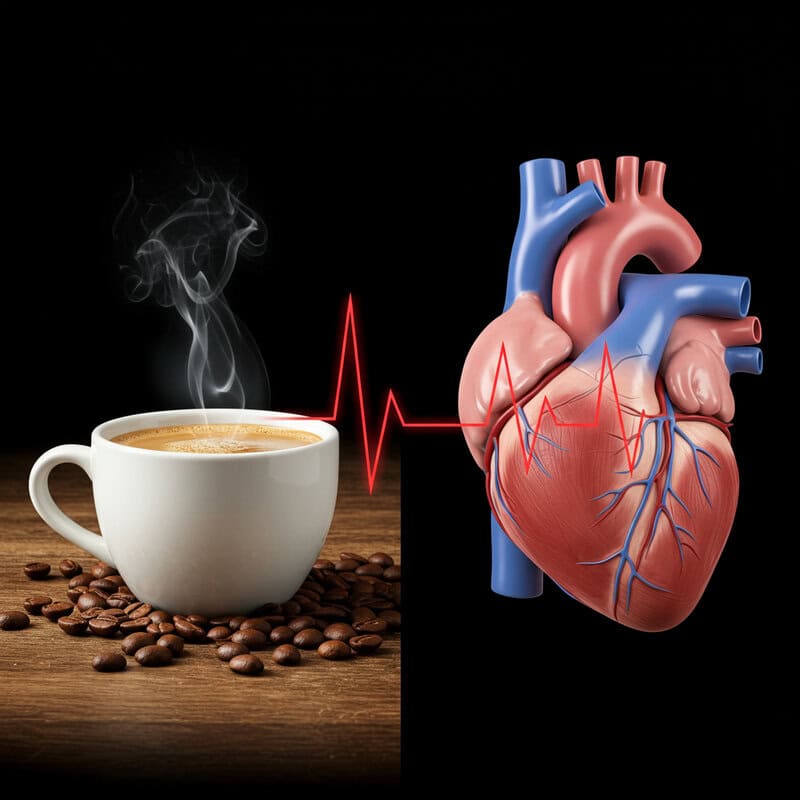
Drinking coffee can lead to a short-term increase in blood pressure, primarily due to the stimulatory effects of caffeine on the cardiovascular system. Caffeine causes blood vessels to constrict and stimulates the release of adrenaline, leading to a temporary rise in blood pressure. According to a study published in Hypertension, this effect is most noticeable in people who are not habitual coffee drinkers or in those with existing hypertension.
In comparison, salty foods raise blood pressure by increasing fluid retention, which puts additional strain on blood vessel walls over time. Unlike salt, the hypertensive effect of coffee is usually transient and diminishes as tolerance to caffeine develops. However, individuals sensitive to caffeine or those with uncontrolled high blood pressure should be cautious.
To monitor your response, check your blood pressure before and after consuming coffee, especially if you have a history of hypertension. Limit your intake to moderate levels—generally up to 400 mg of caffeine daily, per FDA guidelines. If you notice persistent elevations, consider switching to decaf or reducing coffee consumption, and discuss your habits with your healthcare provider.
17. May Reduce Risk of Certain Metabolic Illnesses

Numerous studies suggest that regular coffee consumption is associated with a reduced risk of developing certain metabolic illnesses, particularly type 2 diabetes. A large cohort study published in JAMA Internal Medicine found that individuals who increased their coffee intake by more than one cup per day had an 11% lower risk of type 2 diabetes over four years. This protective effect is believed to result from coffee’s bioactive compounds, such as chlorogenic acids and antioxidants, which may improve insulin sensitivity and reduce inflammation.
When compared to tea, coffee appears to offer similar metabolic benefits. Both beverages contain polyphenols and other bioactives that support glucose regulation and reduce diabetes risk, though the specific compounds and their concentrations differ. Green and black teas have also been linked to a lower incidence of type 2 diabetes, as noted in a meta-analysis published in Diabetes & Metabolism Journal.
Despite these promising findings, experts advise moderation to avoid adverse effects from excessive caffeine. Aim for up to 3-4 cups of coffee per day, and choose unsweetened or lightly sweetened options. Always consult with a healthcare professional if you have pre-existing health conditions or concerns about your metabolic health.
18. Impacts Nutrient Absorption

Coffee contains compounds such as polyphenols and tannins that can interfere with the absorption of certain minerals, particularly non-heme iron found in plant-based foods. When coffee is consumed with meals, it can significantly reduce the amount of iron the body absorbs. According to a study published in The American Journal of Clinical Nutrition, drinking coffee with a meal can decrease iron absorption by up to 39%.
This effect is comparable to that of tea, which is also high in polyphenols and has been shown to inhibit iron absorption even more strongly than coffee. Both beverages have minimal impact on the absorption of heme iron from animal sources, but individuals relying mostly on plant-based diets may be at greater risk for iron deficiency if they frequently pair these drinks with meals.
To minimize nutrient interference, it’s best to enjoy coffee between meals rather than with them. Wait at least an hour after eating before drinking coffee, especially if your diet is low in iron or you are at risk of deficiency. Pairing iron-rich foods with sources of vitamin C can also enhance absorption and offset the inhibitory effects of coffee.
19. Modifies Hormone Balance
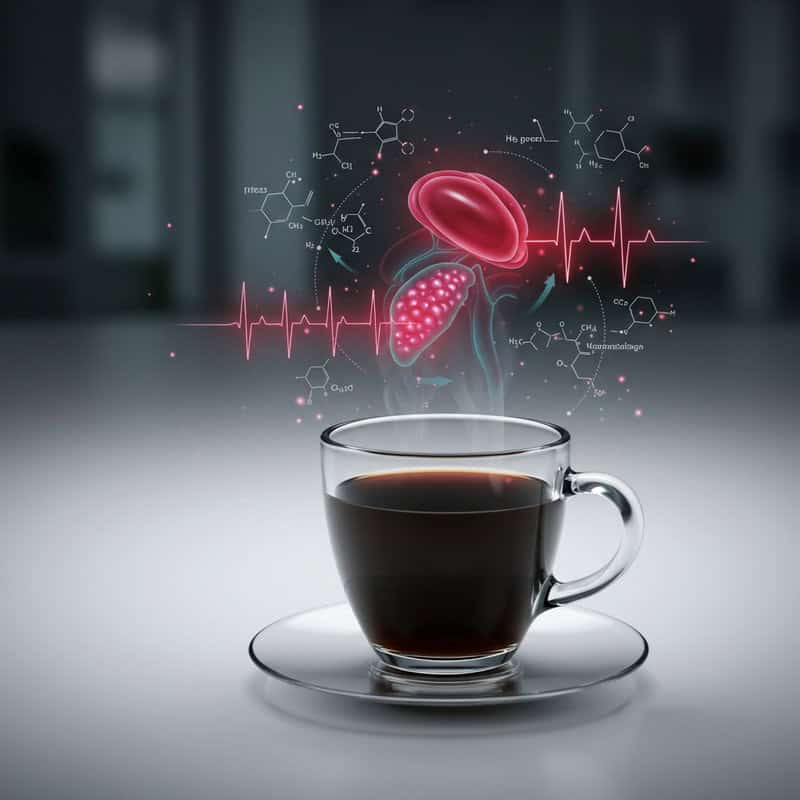
Coffee can significantly influence hormone levels, especially those involved in the body’s stress and energy systems. Caffeine stimulates the adrenal glands, prompting the release of adrenaline (epinephrine), which prepares the body for “fight or flight” responses. This surge increases heart rate, blood pressure, and the mobilization of energy stores, mirroring the physiological effects of acute stress. A study in Neuropsychopharmacology demonstrated that caffeine intake elevates plasma adrenaline in both regular and non-regular coffee consumers.
While this hormonal boost can enhance alertness and physical performance, frequent stimulation may contribute to symptoms associated with chronic stress, such as irritability, anxiety, and sleep disturbances. The body’s ability to handle this stimulation varies; some people develop tolerance, while others remain sensitive and experience pronounced side effects even with moderate intake. The hormonal impact of coffee is similar to the body’s natural response to stress, but repeated or excessive exposure can tax the adrenal system over time.
To avoid unwanted side effects, monitor your body’s response to coffee, especially if you notice increased anxiety, palpitations, or disrupted sleep. Consider reducing consumption or choosing decaffeinated options if you are sensitive to caffeine or have underlying hormonal or stress-related conditions.
20. Can Aggravate Gastrointestinal Disorders
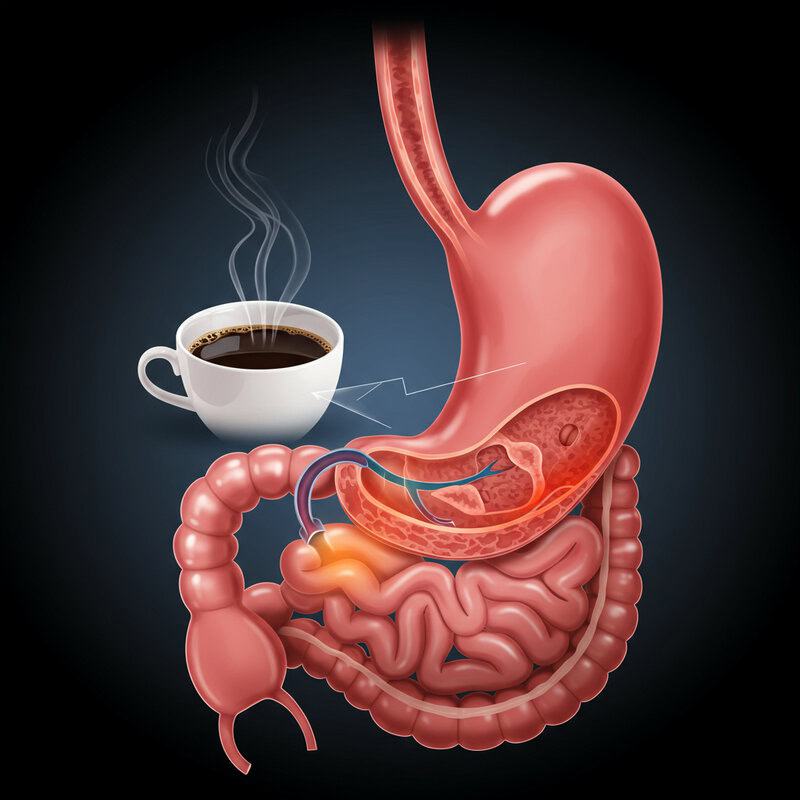
Coffee is known to stimulate gastric acid production, which can exacerbate symptoms in individuals with acid reflux, gastroesophageal reflux disease (GERD), or irritable bowel syndrome (IBS). According to a study in Gastroenterology Research and Practice, coffee significantly increases stomach acid secretion and may relax the lower esophageal sphincter, leading to heartburn or reflux in sensitive individuals.
Similarly, people with IBS may experience increased bowel motility, stomach cramps, or diarrhea after drinking coffee. These effects are comparable to the gastrointestinal responses caused by spicy foods, which can also irritate the digestive tract and trigger symptoms in those with sensitive stomachs. The combination of caffeine and acidic compounds in coffee can be particularly troublesome for some, even in moderate amounts.
To minimize discomfort, individuals with acid reflux or IBS should consider limiting or avoiding coffee, especially on an empty stomach. Opting for low-acid coffee varieties, smaller servings, or switching to herbal teas may provide relief. Tracking your symptoms and consulting with a healthcare professional can help identify triggers and create a personalized plan for managing gastrointestinal health while enjoying your favorite beverages.
21. May Protect Liver Metabolism

Coffee has been shown to offer protective effects on liver metabolism, particularly by reducing liver enzyme levels and potentially lowering the risk of chronic liver diseases. A comprehensive 2021 review published in Clinical Gastroenterology and Hepatology found that regular coffee consumption was associated with a decreased risk of liver fibrosis, cirrhosis, and even hepatocellular carcinoma. Coffee’s bioactive compounds, such as chlorogenic acids and diterpenes, are thought to exert anti-inflammatory and antioxidant effects, helping to safeguard liver cells from damage and support efficient metabolic function.
The review noted that both caffeinated and decaffeinated coffee provided benefits, suggesting that components other than caffeine contribute to liver protection. Coffee drinkers often displayed lower levels of alanine aminotransferase (ALT) and aspartate aminotransferase (AST), two enzymes commonly elevated in liver disease. These findings support coffee’s potential role as a functional beverage for maintaining liver health and metabolic balance.
For safe intake, most experts recommend limiting coffee consumption to 3-4 cups per day to maximize benefits without increasing the risk of side effects. Those with pre-existing liver conditions should consult their healthcare provider for personalized recommendations and to ensure coffee fits safely into their dietary routine.
22. Impacts Mood-Regulating Neurotransmitters
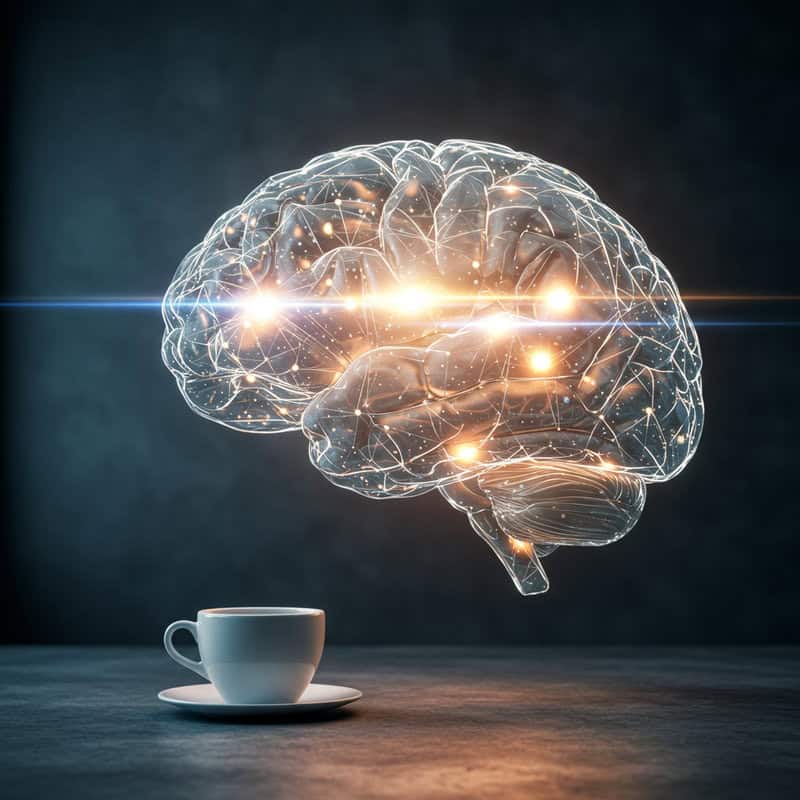
Coffee can influence mood by affecting key neurotransmitters such as dopamine and serotonin, which play central roles in regulating happiness, motivation, and emotional stability. Caffeine increases dopamine signaling by blocking adenosine receptors in the brain, resulting in enhanced alertness and positive mood. According to a review in Frontiers in Psychiatry, this boost in dopamine activity can improve short-term mood and cognitive performance, and may even offer some protection against depression.
Serotonin, another neurotransmitter involved in mood regulation, is also indirectly influenced by coffee. While the effect is less pronounced than with dopamine, caffeine’s stimulating properties can promote feelings of well-being and sociability. These effects are comparable to the mood-enhancing properties of chocolate, which contains compounds that increase both dopamine and serotonin activity, contributing to its reputation as a “feel-good” treat.
Because individual responses to coffee vary, it’s important to track your mood and energy levels after consumption. Some people may experience increased anxiety or mood swings, especially with high caffeine intake or sensitivity. Keeping a mood journal can help you understand your unique response and guide you in optimizing your coffee habits for emotional balance.
23. May Affect Bone Health

There is evidence that excessive coffee consumption may reduce calcium absorption, potentially impacting bone health over time. Caffeine can increase urinary calcium excretion, which may lead to a gradual loss of bone mineral density if dietary calcium intake is insufficient. According to a review published in Nutrients, individuals who consume more than three cups of coffee per day without adequate calcium intake may be at higher risk for osteoporosis or bone fractures, especially postmenopausal women and older adults.
This effect is somewhat similar to that of soda, particularly colas, which contain both caffeine and phosphoric acid and have been strongly associated with decreased bone mineral density. However, coffee’s impact is generally less severe than soda, especially when its consumption is moderate and paired with a calcium-rich diet.
To support bone health, limit coffee intake to 3-4 cups daily, and ensure you are meeting your calcium and vitamin D needs through diet or supplements if necessary. Consider spacing out coffee and calcium-rich meals by at least an hour to optimize absorption. Regular weight-bearing exercise and avoiding excessive soda consumption are additional strategies for maintaining strong, healthy bones.
24. Alters Metabolic Flexibility

Coffee, primarily due to its caffeine content, can influence the body’s metabolic flexibility—the ability to efficiently switch between burning carbohydrates and fats as energy sources. Caffeine stimulates the release of catecholamines like adrenaline, which promote the breakdown of stored fats and increase fatty acid availability in the bloodstream. According to a review in the Journal of Basic and Clinical Physiology and Pharmacology, this process enhances the body’s capacity to oxidize fat, especially during physical activity or fasting states.
The effect of coffee on metabolic flexibility is conceptually similar to the adaptations seen with ketogenic diets, which train the body to use fat as a primary fuel source due to restricted carbohydrate intake. While coffee’s impact is more transient and less pronounced than sustained dietary changes, it can provide a temporary boost in fat burning and energy availability, particularly before exercise or during fasting windows.
The benefits of enhanced metabolic flexibility include improved energy efficiency, better blood sugar regulation, and potentially greater endurance. However, these benefits are limited if coffee is consumed with large amounts of sugar or cream, which add extra calories and shift metabolism toward carbohydrate use. For optimal results, pair black coffee with a balanced diet and regular physical activity.
25. Modulates Inflammation

Coffee contains a variety of bioactive compounds, including polyphenols and chlorogenic acids, that exhibit anti-inflammatory properties. These compounds help to neutralize free radicals and reduce the production of pro-inflammatory cytokines, thereby supporting the body’s defense against chronic inflammation. A review in Frontiers in Psychiatry highlights how regular coffee consumption is associated with lower levels of inflammatory markers, potentially reducing the risk of conditions such as cardiovascular disease and metabolic syndrome.
In comparison, turmeric is another well-known dietary anti-inflammatory due to its active component, curcumin. While both coffee and turmeric offer protective benefits, turmeric’s effects are typically stronger and more targeted, especially when consumed as part of a regular anti-inflammatory regimen. Still, coffee can be a valuable contributor to an overall anti-inflammatory lifestyle.
To maximize anti-inflammatory benefits, consider pairing coffee with a diet rich in colorful fruits, leafy vegetables, nuts, seeds, and fatty fish. Limit intake of processed foods, added sugars, and saturated fats, which can promote inflammation. Drinking coffee in moderation as part of a balanced diet can support metabolic and overall health while helping to keep inflammation in check.
26. May Increase Anxiety in Sensitive Individuals

Coffee’s caffeine content can increase feelings of anxiety, particularly in individuals who are more sensitive to stimulants or who already experience anxiety disorders. Caffeine stimulates the central nervous system and activates the body’s fight-or-flight response, leading to symptoms such as restlessness, nervousness, rapid heartbeat, and even panic attacks in some people. Research published in Current Neuropharmacology shows a clear association between high caffeine intake and increased anxiety, especially in those predisposed to such reactions.
Energy drinks, which often contain higher doses of caffeine along with other stimulants like taurine and guarana, can cause even more pronounced anxiety and jitteriness compared to coffee. The additional sugars and artificial additives in these drinks can further exacerbate mood swings and physical symptoms.
To reduce anxiety symptoms related to coffee, consider limiting your intake to one or two cups per day and avoiding consumption on an empty stomach. Opt for lower-caffeine options, such as half-caff or decaffeinated coffee, and steer clear of energy drinks altogether. Practicing relaxation techniques, staying hydrated, and monitoring your body’s response can help you find a comfortable balance between enjoying coffee and maintaining emotional well-being.
27. Alters Metabolic Gene Expression
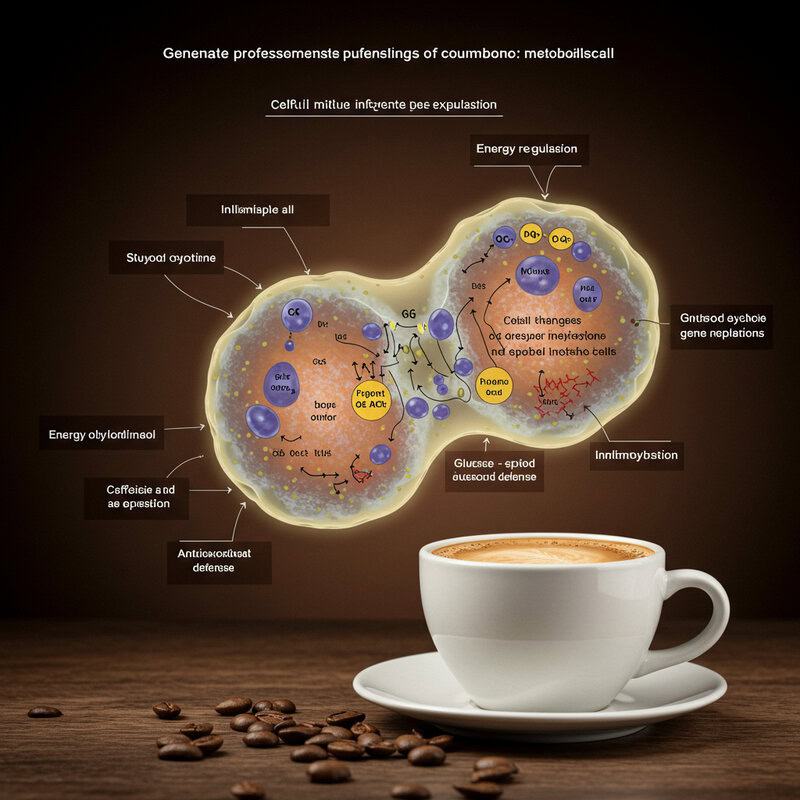
Recent research suggests that coffee consumption can influence the expression of genes involved in metabolism, energy regulation, and inflammation. Compounds in coffee, such as caffeine and polyphenols, have been shown to modulate the activity of genes related to fat oxidation, glucose metabolism, and antioxidant defense. A review in Frontiers in Psychiatry highlights findings that regular coffee intake can upregulate genes protecting against oxidative stress while downregulating those associated with chronic inflammation and metabolic dysfunction.
This gene-modulating influence is similar to the effects of regular exercise, which also triggers beneficial changes in gene expression to improve metabolic efficiency, enhance fat utilization, and reduce disease risk. However, the genetic response to coffee is highly individualized, with genetic variants determining how quickly one metabolizes caffeine and responds to coffee’s bioactive compounds.
Given these personalized responses, it’s important to observe how your body reacts to daily coffee intake. Some may benefit from its positive metabolic gene shifts, while others might experience unwanted side effects. If you have a family history of metabolic disorders or are considering changes to your coffee habits, consult a healthcare professional and consider genetic testing for a tailored approach to optimizing your metabolism.
28. May Promote Healthy Aging

Emerging research indicates that regular coffee consumption may be linked to slower metabolic aging and increased longevity. Coffee’s antioxidant-rich profile, including polyphenols and chlorogenic acids, helps combat oxidative stress and inflammation—two key drivers of cellular aging and age-related diseases. A large-scale study published in JAMA Internal Medicine found that individuals who drank coffee daily had a lower risk of all-cause mortality, suggesting coffee’s potential role in promoting healthy aging.
This longevity-promoting effect is similar to the benefits seen with the Mediterranean diet, which emphasizes plant-based foods, healthy fats, and moderate wine consumption. Both coffee and the Mediterranean diet provide a wealth of antioxidants and anti-inflammatory nutrients that protect against age-related metabolic decline and chronic illnesses like cardiovascular disease, diabetes, and neurodegenerative conditions.
To maximize the healthy aging benefits of coffee, combine moderate consumption (about 3-4 cups per day) with a nutrient-dense diet rich in fruits, vegetables, whole grains, and healthy fats. Engage in regular physical activity, maintain social connections, and prioritize restorative sleep. These comprehensive lifestyle strategies, when paired with coffee, can help support vitality and longevity as you age.
29. Influences Thyroid Function
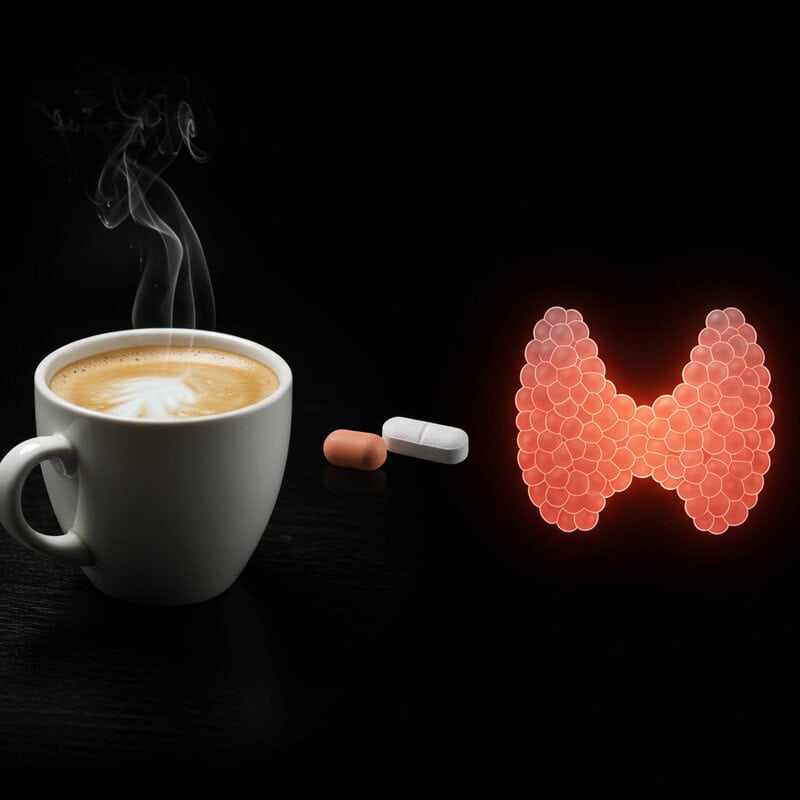
Coffee can interfere with the absorption of thyroid hormones, particularly levothyroxine, a medication commonly prescribed for hypothyroidism. Studies have shown that drinking coffee within an hour of taking thyroid medication can significantly decrease the amount of hormone absorbed, potentially leading to suboptimal thyroid levels and symptoms of underactive thyroid. A study in Thyroid demonstrated that patients who took levothyroxine with coffee had lower serum thyroxine (T4) concentrations compared to those who took the medication with water alone.
This interaction is similar to the way coffee and other beverages can affect the absorption of certain medications and nutrients. For example, calcium and iron supplements are also less efficiently absorbed when taken with coffee, due to the beverage’s polyphenols and other compounds that bind minerals and drugs in the digestive tract.
To ensure optimal thyroid hormone absorption, it’s recommended to take thyroid medication with a full glass of water and wait at least 30 to 60 minutes before consuming coffee or breakfast. If you’re on thyroid medication, consult your healthcare provider for personalized guidance and to monitor your hormone levels, ensuring that both your medication and coffee habits support your metabolic and endocrine health.
30. Affects Blood Lipid Profile

Coffee can have a measurable effect on blood lipid profiles, particularly on LDL (“bad”) and HDL (“good”) cholesterol levels. Research shows that unfiltered coffee, such as that made with a French press or Turkish method, contains higher amounts of diterpenes like cafestol and kahweol. These compounds can raise LDL cholesterol levels when consumed regularly. A study published in The BMJ found that daily consumption of unfiltered coffee elevated LDL cholesterol and total cholesterol, while filtered coffee had a much smaller impact due to removal of these substances by paper filters.
Butter coffee or “bulletproof coffee,” which combines brewed coffee with butter and medium-chain triglyceride (MCT) oil, can further influence blood lipids. The added saturated fats may increase total and LDL cholesterol, particularly if consumed in large quantities or as a meal replacement. While some proponents claim metabolic benefits, the long-term effects on cardiovascular health remain debated.
For heart health, opt for filtered brewing methods and be cautious with high-fat coffee recipes. Regular monitoring of your cholesterol levels through blood tests is recommended, especially if you have a history of dyslipidemia or cardiovascular risk. Consult your healthcare provider for individualized advice on coffee and lipid management.
31. Can Exacerbate Migraines
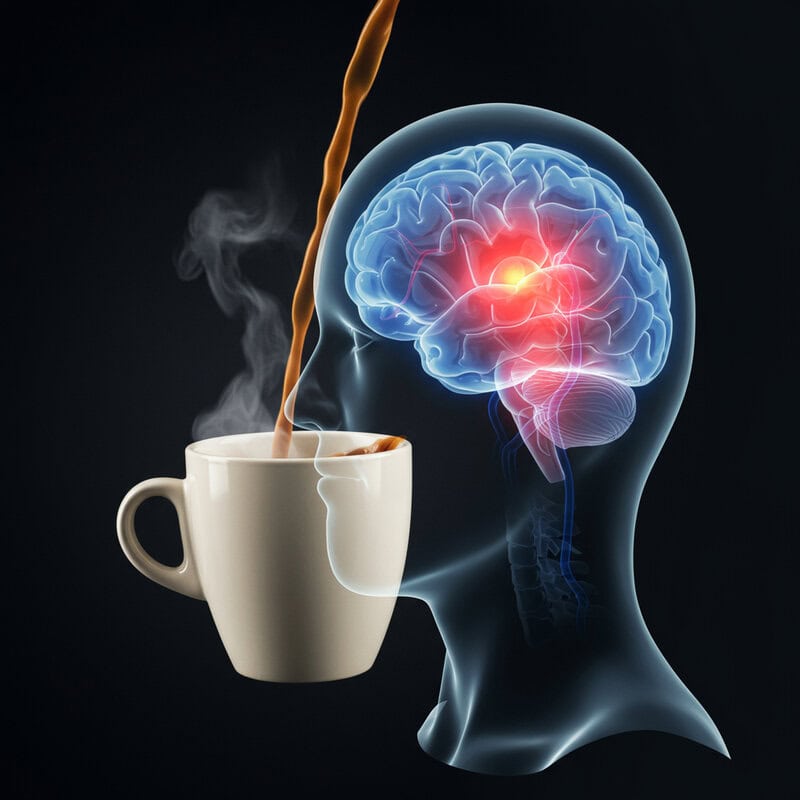
Coffee’s caffeine content has a complex relationship with migraines, acting as both a potential trigger and a remedy depending on individual sensitivity and consumption patterns. On one hand, caffeine can constrict blood vessels in the brain, providing relief for some migraine sufferers and forming the basis for several over-the-counter headache medications. A study in the American Journal of Medicine found that occasional caffeine intake could help abort migraine attacks when used at the onset of symptoms.
However, excessive or irregular coffee consumption may trigger migraines or worsen their frequency in sensitive individuals. Sudden withdrawal from caffeine can also lead to rebound headaches, a well-known phenomenon among regular coffee drinkers. Chocolate, which contains both caffeine and other stimulants, shows a similar dual effect—sometimes providing relief but occasionally acting as a migraine trigger.
For those prone to migraines, consistency is key. Track your caffeine intake and observe your individual response. If coffee appears to trigger headaches, consider reducing your intake gradually rather than quitting abruptly to avoid withdrawal symptoms. Consult a healthcare professional for personalized migraine management strategies and to determine if moderate coffee consumption can be safely incorporated into your routine.
32. Influences Detoxification Pathways
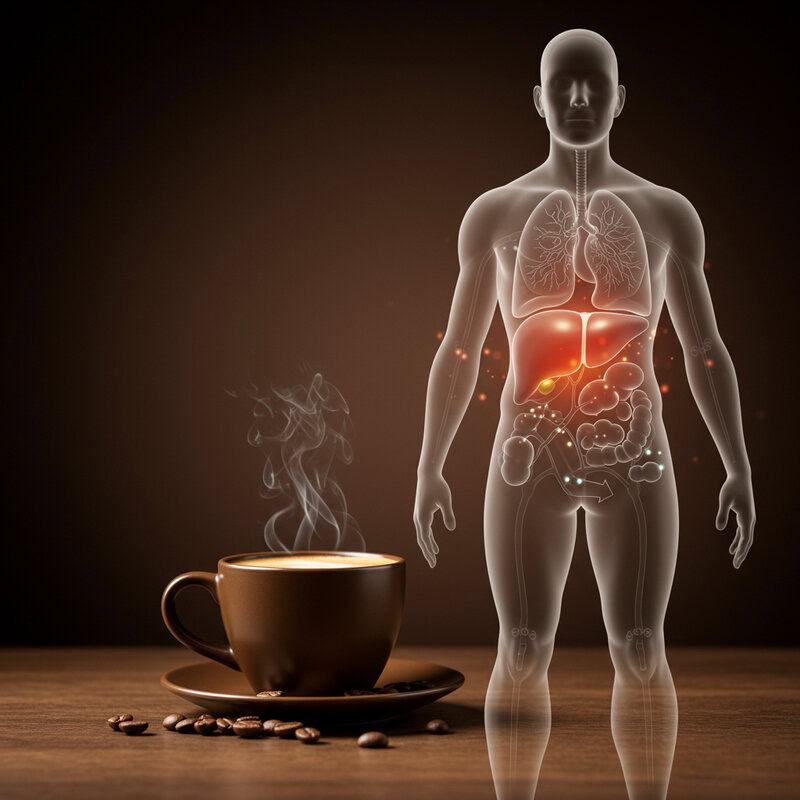
Coffee plays a notable role in supporting the body’s detoxification processes, particularly through the activation of liver enzymes involved in phase I and phase II detoxification. Compounds such as cafestol, kahweol, and chlorogenic acids can stimulate the activity of enzymes like glutathione S-transferase, which aids in neutralizing and eliminating toxins from the body. A review published in Frontiers in Psychiatry highlights coffee’s ability to enhance hepatic detoxification pathways and reduce oxidative stress, contributing to overall metabolic health.
This effect is comparable to that of cruciferous vegetables (such as broccoli, Brussels sprouts, and kale), which are also renowned for boosting the body’s natural detoxification systems through their glucosinolate content. When combined, a diet rich in both coffee and cruciferous vegetables may offer synergistic benefits for liver function and systemic detoxification.
To further support detoxification, maintain a balanced diet rich in fiber, antioxidants, and hydration. Limit exposure to processed foods, excess alcohol, and environmental toxins. Regular physical activity and adequate sleep also promote effective detox pathways. As always, moderation is key—excessive coffee intake can cause adverse effects, so aim for a balanced approach to optimize your body’s natural cleansing systems.
33. May Reduce Risk of Neurodegenerative Diseases

Numerous studies have found that regular coffee consumption is associated with a lower risk of developing neurodegenerative diseases, such as Alzheimer’s and Parkinson’s. A review in Frontiers in Psychiatry highlights that caffeine and other bioactive compounds in coffee exert neuroprotective effects by reducing oxidative stress, inflammation, and amyloid plaque formation—key contributors to neurodegeneration. Specifically, habitual coffee drinkers have been found to have up to a 32% lower risk of Parkinson’s disease and a reduced risk of cognitive decline and Alzheimer’s disease compared to non-drinkers.
Green tea demonstrates similar protective benefits, attributed to its high content of catechins and L-theanine, both of which support brain health and reduce oxidative damage. While both beverages offer cognitive protection, coffee tends to have a stronger association with reduced Parkinson’s risk, whereas green tea is more closely linked to improvements in attention and memory.
For optimal neuroprotective benefits, moderation is recommended—about three to four cups of coffee per day. Excessive caffeine can cause adverse effects, such as anxiety or insomnia, which may counteract cognitive benefits. Combine coffee consumption with a balanced diet, regular exercise, and mental stimulation for comprehensive support of brain health as you age.
34. Alters Heart Rate

One of the immediate physiological effects of coffee is a temporary increase in heart rate, primarily due to caffeine’s stimulant action on the central nervous system. Caffeine blocks adenosine receptors, leading to heightened sympathetic nervous system activity, which can result in palpitations or a faster heartbeat, especially in individuals sensitive to stimulants. A study published in Circulation confirmed that moderate to high doses of caffeine can produce a noticeable rise in heart rate for up to several hours after consumption.
This acute effect can be compared to the increase in heart rate experienced during moderate physical exercise, though the underlying mechanisms differ. While exercise elevates heart rate to improve oxygen delivery during activity, caffeine-induced increases are not always accompanied by increased physical demand and may feel uncomfortable for some people.
If you experience a rapid or irregular heartbeat after drinking coffee, consider reducing your intake or spacing out consumption throughout the day. Monitoring your pulse before and after coffee can help you gauge your sensitivity. Individuals with pre-existing arrhythmias or cardiovascular conditions should consult a healthcare provider for personalized advice regarding safe coffee consumption and heart health.
35. Can Affect Reproductive Hormones

Coffee consumption may influence reproductive hormones, particularly estrogen, which plays a key role in menstrual health and fertility. Research suggests that caffeine can alter estrogen metabolism, with effects varying based on genetics and ethnicity. A study published in the American Journal of Clinical Nutrition found that Asian women who consumed 200 mg or more of caffeine daily exhibited higher estrogen levels, while white women showed slightly lower levels. These hormonal shifts could potentially affect menstrual cycles and ovulation in sensitive individuals.
Similar to alcohol, which is also known to disrupt hormone balance and fertility, excessive coffee intake has been linked to delayed conception and lower pregnancy rates in some studies. However, moderate coffee consumption (up to 200 mg of caffeine daily, or about two cups) is generally considered safe for most women trying to conceive, according to the American College of Obstetricians and Gynecologists.
For reproductive health, limit caffeine intake if you are planning a pregnancy or experiencing hormonal issues. Maintain a balanced diet, manage stress, and avoid excessive alcohol. Consult your healthcare provider for personalized guidance, especially if you have concerns about fertility or hormonal balance.
36. Impacts Metabolic Response to Stress
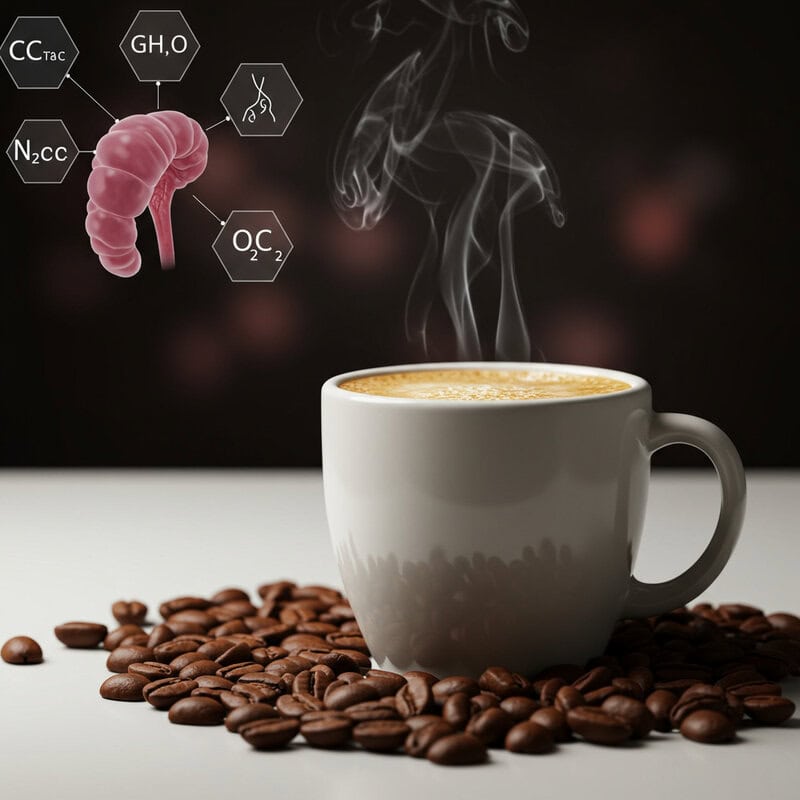
Coffee’s caffeine content can amplify the body’s metabolic response to stress by stimulating the adrenal glands and increasing the production of stress hormones like cortisol and adrenaline. This heightened state can lead to increased heart rate, blood pressure, and mobilization of energy reserves, mimicking the body’s natural “fight-or-flight” reaction. A review in Current Neuropharmacology demonstrates how caffeine can intensify both the subjective and physiological response to stressful events, especially in individuals who are sensitive to stimulants or under chronic stress.
In contrast, practices such as meditation elicit the opposite effect, activating the parasympathetic nervous system and promoting relaxation, lowered cortisol levels, and improved metabolic regulation. Regular meditation or mindfulness can buffer the impact of stress and support a healthier metabolic profile, even for those who enjoy moderate coffee consumption.
To manage stress effectively, balance your coffee intake with stress-reducing techniques such as deep breathing, yoga, regular exercise, and adequate sleep. Pay attention to how coffee affects your mood and energy during stressful periods, and consider reducing intake if you experience heightened anxiety or irritability. Adopting a holistic approach can help maintain metabolic harmony amid life’s daily challenges.
37. May Trigger Heart Palpitations
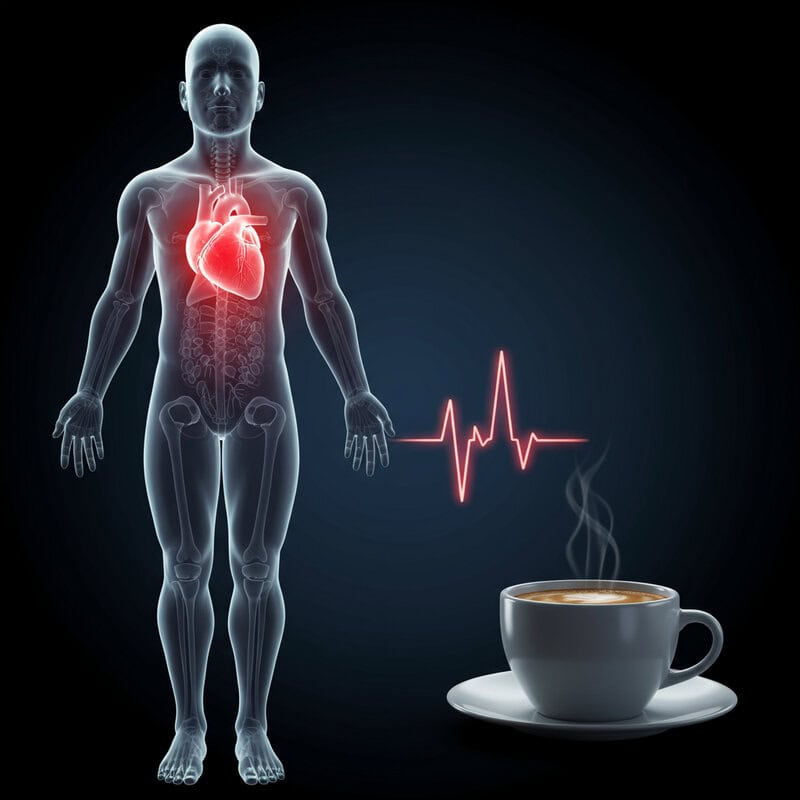
Some individuals are particularly susceptible to experiencing heart palpitations—sensations of skipped, fluttering, or rapid heartbeats—after consuming coffee. This response is primarily due to caffeine’s stimulatory effect on the heart and central nervous system, which can increase heart rate and alter electrical conduction within the heart. According to a review published in the Journal of the American College of Cardiology, caffeine can provoke palpitations and even arrhythmias, especially in those with underlying heart conditions or heightened sensitivity to stimulants.
Energy drinks, which often contain much higher levels of caffeine as well as additional stimulants like taurine and guarana, are even more likely to induce palpitations and cardiovascular disturbances compared to coffee. The risk is compounded by the rapid consumption of large quantities and the presence of sugars and other additives.
If you are prone to heart palpitations, consider limiting your coffee intake to one or two cups daily, avoid strong or concentrated brews, and steer clear of energy drinks altogether. Monitor your heart rhythm after consuming caffeinated beverages, and consult your healthcare provider if palpitations persist, worsen, or are accompanied by chest pain or dizziness for personalized management and safety.
38. Alters Gut Motility
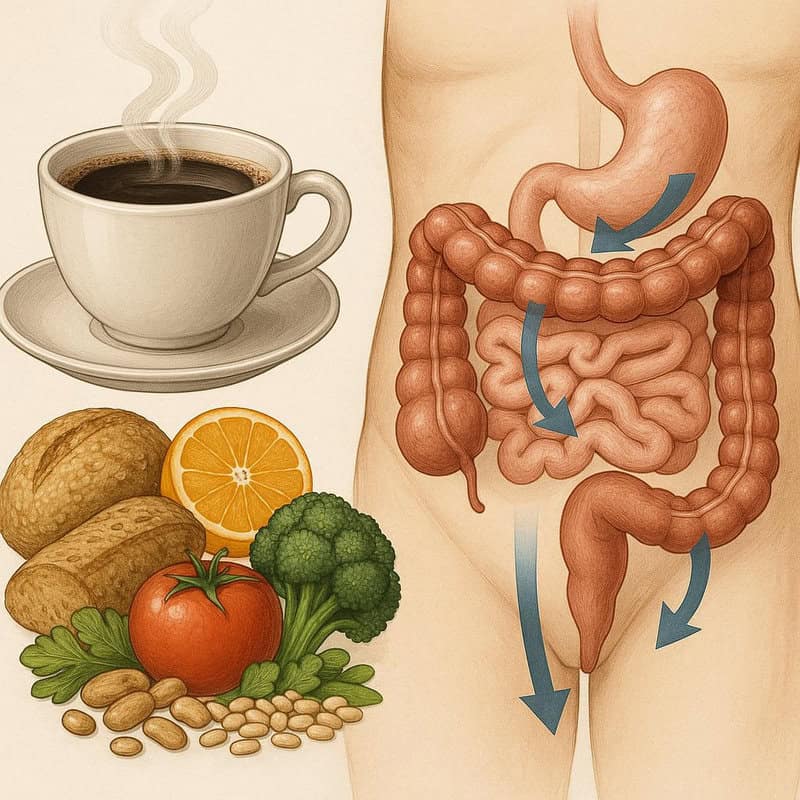
Coffee is well known for its ability to stimulate gut motility, often leading to an urge to have a bowel movement shortly after consumption. This effect is due to both caffeine and other compounds in coffee that enhance the contraction of intestinal muscles and stimulate the release of the hormone gastrin, which promotes digestive activity. A review in Frontiers in Psychiatry confirms that coffee can increase colonic motor activity more effectively than warm water, making it a common choice for those seeking natural relief from mild constipation.
This action is comparable to the effects of dietary fiber, which adds bulk to stool and encourages regular bowel movements. However, while fiber works by retaining water and increasing stool volume, coffee acts more rapidly by stimulating the nervous system and gastrointestinal tract directly. For some, particularly those with sensitive digestive systems or conditions like IBS, this stimulatory effect can also lead to cramping or diarrhea.
For optimal digestive health, combine moderate coffee consumption with a fiber-rich diet including whole grains, fruits, vegetables, and legumes. Stay well hydrated, and pay attention to your body’s response to coffee. If digestive discomfort occurs, adjust your intake or timing, and consult a healthcare professional if symptoms persist.
39. Can Influence Blood Clotting
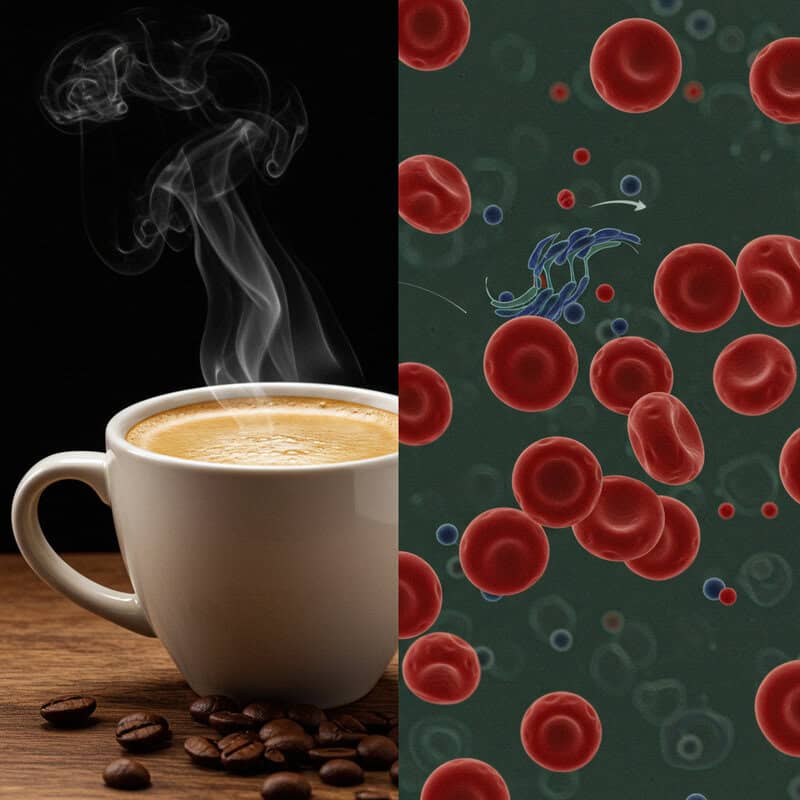
Emerging research suggests that coffee may have a modest impact on blood clotting mechanisms. Some studies propose that bioactive components in coffee, such as polyphenols, can inhibit platelet aggregation, the process by which blood cells clump together to form clots. A study published in Nutrition Journal found that regular coffee consumption was associated with reduced platelet aggregation, potentially lowering the risk of unwanted blood clots that can lead to cardiovascular events.
This effect is somewhat similar to that of red wine, which contains resveratrol and other polyphenols that are also believed to reduce platelet activity and offer cardiovascular protection. However, the impact of coffee is less pronounced and more variable compared to the well-documented antiplatelet activity of moderate red wine consumption.
For individuals taking blood thinners or anticoagulant medications, it’s important to be aware of all dietary factors that can influence clotting. If you drink coffee regularly and are prescribed these medications, consult your healthcare provider to ensure your intake is safe and does not interfere with your treatment plan. Always monitor for unusual bruising or bleeding and report any concerns promptly.
40. May Affect Medication Metabolism
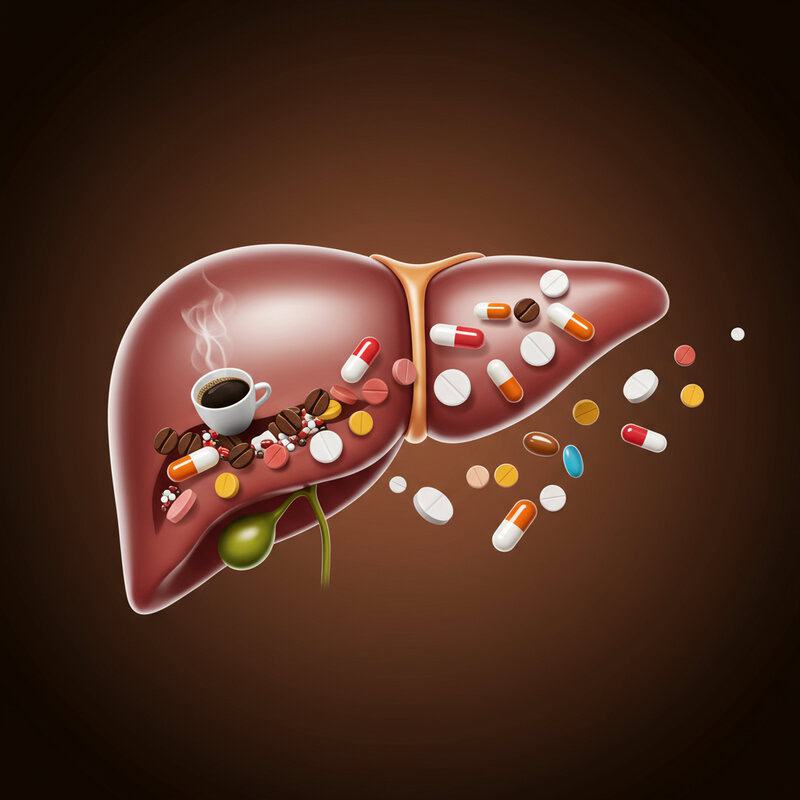
Coffee can interact with the metabolism of various medications, altering their effectiveness and potentially leading to side effects. Caffeine and other coffee compounds are metabolized in the liver by cytochrome P450 enzymes, particularly CYP1A2, which is also responsible for breaking down several common drugs. According to a review in Drug Metabolism & Disposition, coffee can either speed up or slow down the metabolism of medications such as certain antidepressants, antipsychotics, blood thinners, and thyroid drugs, depending on genetic factors and dosage.
This effect is somewhat similar to grapefruit, which is known for its strong inhibitory action on liver enzymes, leading to higher levels of some medications in the blood. While coffee’s interactions are generally milder, they can still be significant, especially for drugs with a narrow therapeutic range or for individuals consuming large amounts of coffee.
If you are taking prescription medications, it’s wise to discuss your coffee habits with your healthcare provider or pharmacist. They can advise you on potential interactions and the best timing for taking your medications relative to coffee consumption. Regular monitoring and open communication can help prevent unwanted side effects and ensure your medications work as intended.
41. Supports Antioxidant Defenses

Coffee is one of the richest sources of antioxidants in the average adult diet, providing a significant contribution to daily antioxidant intake. Its polyphenols, such as chlorogenic acids, act to neutralize free radicals and protect cells from oxidative stress. According to a review in Frontiers in Psychiatry, coffee’s antioxidant content may help reduce the risk of chronic diseases, including cardiovascular disease and certain cancers, by supporting the body’s natural defenses.
This antioxidant power is comparable to that found in berries—such as blueberries, strawberries, and blackberries—which are also celebrated for their high levels of polyphenols and vitamin C. While berries offer a broader spectrum of nutrients, including fiber and vitamins, coffee stands out for its unique antioxidant profile and regular consumption patterns among adults worldwide.
To maximize your antioxidant protection, include a variety of antioxidant-rich foods in your diet. Combine coffee with colorful fruits and vegetables, nuts, seeds, and whole grains for comprehensive coverage. Enjoy coffee in moderation, preferably black or with minimal added sugar, to maintain its health benefits. This approach helps support cellular health and may contribute to long-term disease prevention.
42. Influences Adiponectin Levels
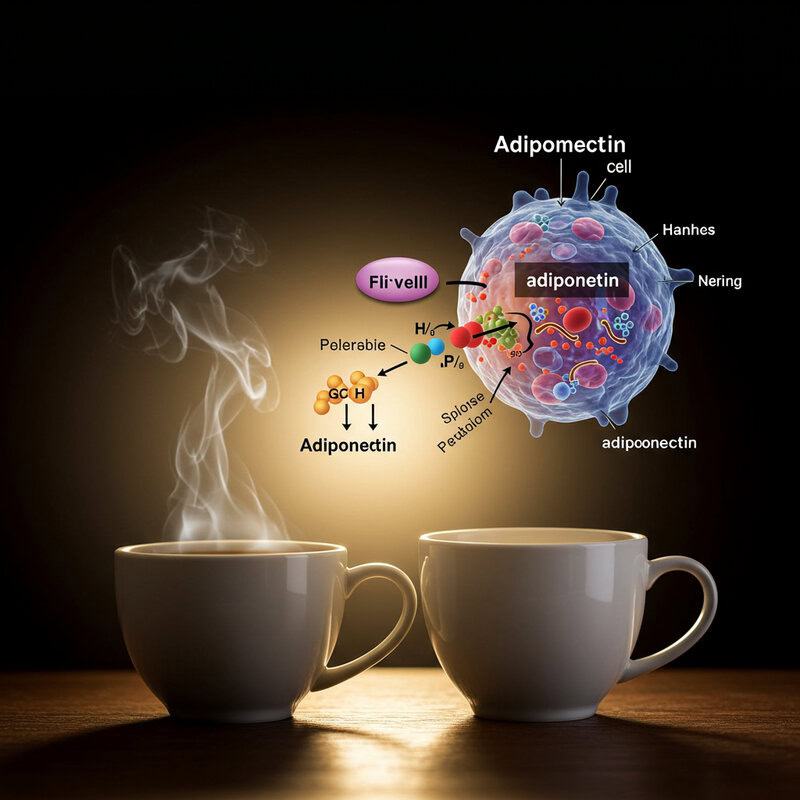
Coffee has been shown to increase levels of adiponectin, a hormone produced by fat cells that plays a crucial role in regulating glucose levels and promoting fat burning. Higher adiponectin levels are associated with improved insulin sensitivity, reduced inflammation, and a lower risk of metabolic diseases such as type 2 diabetes and cardiovascular disease. A study published in Nutrition & Diabetes found that regular coffee consumption was linked to significantly higher adiponectin concentrations in both men and women.
This effect is similar to the metabolic benefits seen with regular exercise, which also stimulates adiponectin production and enhances the body’s ability to utilize fat as an energy source. Both coffee and exercise contribute to a healthier metabolic profile, but their effects are complementary rather than interchangeable. While exercise provides broader health improvements, coffee can offer a convenient metabolic boost when included as part of an overall healthy lifestyle.
To maximize the metabolic benefits of raised adiponectin, combine moderate coffee consumption (up to three or four cups per day) with regular physical activity and a balanced diet rich in whole grains, lean proteins, healthy fats, and plenty of fruits and vegetables. This holistic approach supports optimal metabolic health and energy balance.
43. May Cause Withdrawal Symptoms

Regular coffee consumption can lead to physical dependence on caffeine, and abrupt cessation often triggers withdrawal symptoms that can significantly affect metabolism and overall well-being. Common symptoms include headaches, fatigue, irritability, decreased alertness, and in some cases, mild depression. These effects are due to the body’s adaptation to regular caffeine intake, which alters neurotransmitter activity and metabolic rate. A review in Nutrition notes that caffeine withdrawal can temporarily reduce basal metabolic rate, leading to feelings of sluggishness and low energy.
This withdrawal pattern is similar, though less intense, to what is experienced when quitting nicotine, another stimulant that affects the central nervous system and metabolism. While nicotine withdrawal is often more severe and longer lasting, both substances require the body to readjust to the absence of a regularly consumed stimulant.
To minimize withdrawal symptoms, it’s advisable to gradually reduce coffee intake rather than stopping suddenly. Slowly decrease the number of cups per day or switch to beverages with lower caffeine content, such as half-caff or decaf coffee. Stay hydrated, maintain a healthy diet, and get plenty of sleep during the transition. If withdrawal symptoms persist, consult a healthcare professional for additional guidance.
44. Alters Taste Perception

Coffee can temporarily alter taste perception, particularly due to its bitterness and acidity. The compounds in coffee, such as chlorogenic acids and caffeine, can dull the taste buds’ sensitivity to sweetness while enhancing the perception of bitter flavors. A review in Nutrition notes that caffeine consumption can suppress receptors for sweet and umami tastes, potentially influencing subsequent food choices and cravings.
Much like spicy foods, which can numb certain taste receptors and heighten the desire for cooling or bland foods, coffee may lead some individuals to crave sweeter or creamier items immediately after drinking. This is why pastries and sweetened creamers are often paired with coffee, as they help balance out the beverage’s natural bitterness and acidity. Over time, regular coffee consumption may also shift overall taste preferences, increasing tolerance for bitter foods and drinks.
To cultivate mindful eating habits, pay attention to how coffee affects your palate and cravings. Consider enjoying coffee without excessive sweeteners or high-sugar accompaniments, and allow your taste buds to reset between meals and beverages. This approach can help support healthier food choices and prevent unnecessary calorie intake driven by altered taste perception.
45. Can Impact Blood Flow
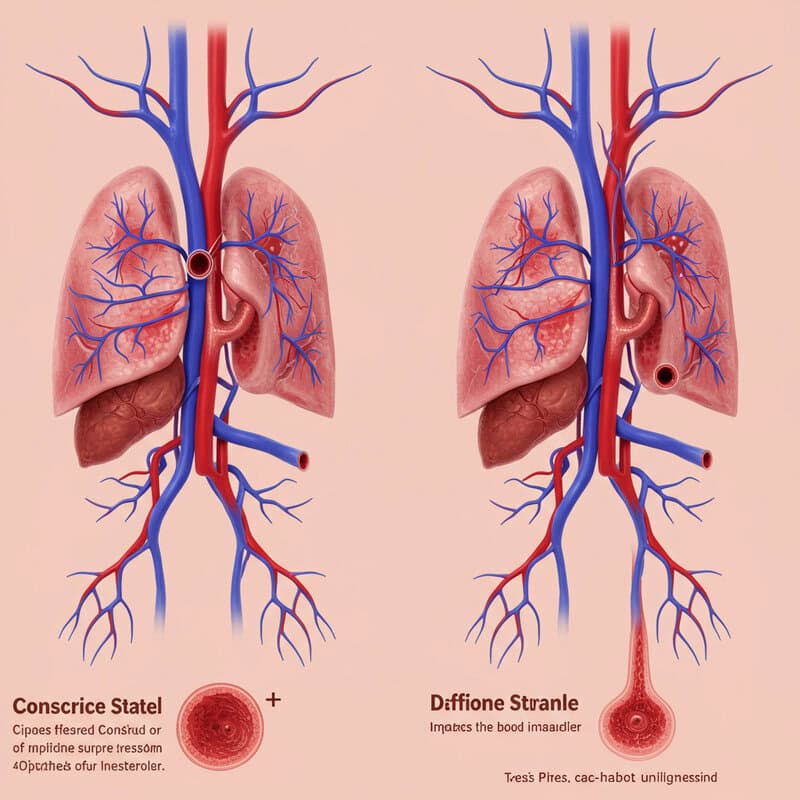
Coffee’s caffeine content can influence blood flow by affecting the dilation and constriction of blood vessels. Caffeine acts as a vasoconstrictor, temporarily narrowing blood vessels and increasing blood pressure, which can reduce peripheral blood flow soon after consumption. According to a review in Frontiers in Psychiatry, this effect is most noticeable in individuals who are not habitual coffee drinkers or those with pre-existing cardiovascular conditions.
This response contrasts with the effects of nitric oxide boosters, such as beets or leafy greens, which promote vasodilation and improve blood flow by relaxing blood vessel walls. While coffee may reduce blood flow to certain areas temporarily, nitric oxide-rich foods can increase circulation and oxygen delivery to tissues—making them popular among athletes and those seeking cardiovascular support.
To monitor the impact of coffee on your circulation, pay attention to symptoms such as cold extremities, tingling, or changes in blood pressure after drinking coffee. If you have concerns about circulation or cardiovascular health, consider balancing coffee intake with foods that support vasodilation and consult your healthcare provider for personalized guidance on optimizing blood flow and overall vascular health.
46. May Influence Weight Loss Efforts

Coffee has garnered attention for its potential role in supporting weight loss efforts. Studies indicate that caffeine can increase energy expenditure and promote fat oxidation, potentially helping individuals burn more calories throughout the day. A review published in Critical Reviews in Food Science and Nutrition found that regular coffee consumption is associated with modest reductions in body weight and body fat, particularly when combined with an active lifestyle and a balanced diet.
Unlike meal replacement shakes, which are designed to provide controlled calories and nutrients in place of a meal, coffee itself contains negligible calories unless sweeteners or creamers are added. While coffee may reduce appetite temporarily, it should not be used as a substitute for balanced meals. Meal replacements can support weight loss by ensuring nutritional adequacy, whereas excessive reliance on coffee may lead to missed nutrients and energy crashes.
For healthy weight management, enjoy coffee in moderation—preferably black or with minimal additions—and avoid high-calorie specialty drinks. Pair coffee consumption with regular physical activity, mindful eating, and a nutrient-rich diet. Track your progress and adjust your approach as needed. Consult a healthcare professional for personalized weight loss guidance and to ensure sustainable, long-term results.
47. Affects Aging of Skin

Coffee’s rich antioxidant content may offer protective effects for skin metabolism, helping to counteract some signs of aging. Polyphenols and chlorogenic acids found in coffee can reduce oxidative stress and inflammation, both of which contribute to skin aging, wrinkles, and loss of elasticity. A review in Skin Pharmacology and Physiology highlights that both consumption and topical application of coffee-derived compounds can improve skin health and potentially slow the aging process.
In contrast, excessive sun exposure remains the most significant external factor that accelerates skin aging by damaging collagen and increasing free radical formation. While coffee may provide some internal protection against oxidative damage, it cannot substitute for proper sun protection measures. The combined effects of antioxidants from coffee and diligent sun care can work synergistically to support youthful skin.
For optimal skin health, enjoy coffee as part of an antioxidant-rich diet that includes fruits and vegetables, and always use broad-spectrum sunscreen when spending time outdoors. Avoid smoking and stay hydrated, as these habits also influence skin metabolism and appearance. If you have skin concerns or conditions, consult a dermatologist for advice on integrating dietary and topical antioxidants into your skincare routine.
48. May Alter Sensitivity to Other Stimulants

Coffee’s caffeine content can interact with other stimulants—such as those found in medications, supplements, or energy drinks—potentially amplifying their effects or altering your sensitivity to them. Caffeine stimulates the central nervous system and increases alertness, but when combined with other stimulants like ephedrine, guarana, or certain prescription drugs (e.g., ADHD medications), the risk of side effects such as anxiety, insomnia, rapid heartbeat, or high blood pressure may increase. A review in Current Neuropharmacology highlights that combining caffeine with other stimulants can have unpredictable and sometimes dangerous consequences, particularly in sensitive individuals.
This risk is especially pronounced with energy drinks, which often contain multiple stimulants along with caffeine. The synergistic effects can lead to “overstimulation,” manifesting as jitteriness, agitation, heart palpitations, or, in extreme cases, cardiovascular complications. Coffee alone is typically safer than energy drinks when consumed in moderation, but caution is warranted when mixing sources of stimulation.
For safe use, limit total daily caffeine intake from all sources to no more than 400 mg (about four cups of brewed coffee), avoid combining coffee with other stimulant-containing products, and pay attention to how your body responds. If you experience adverse effects, reduce intake and consult a healthcare provider for personalized recommendations.
49. Influences Appetite-Regulating Peptides
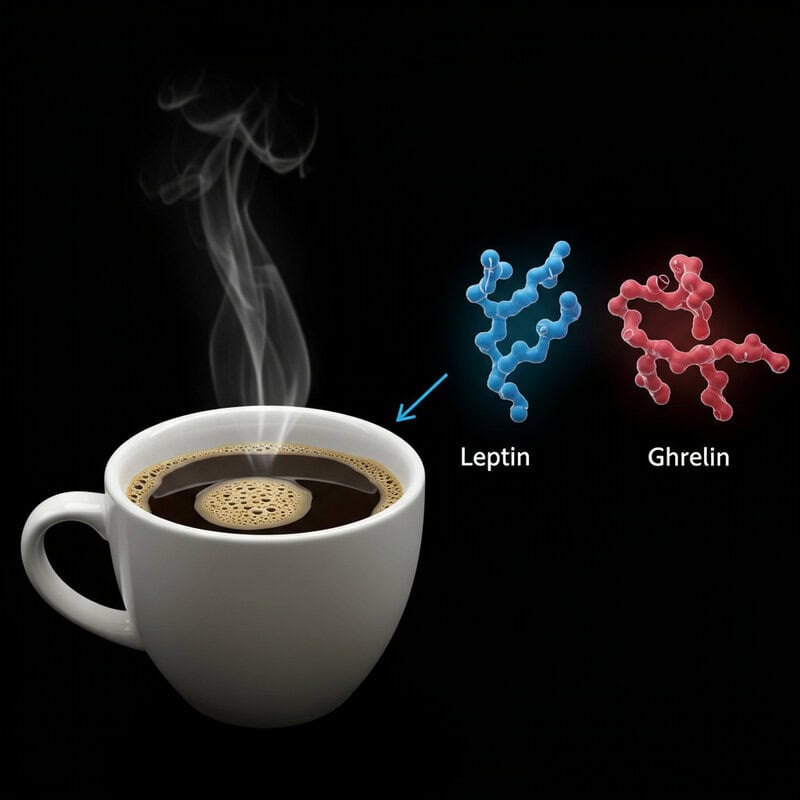
Coffee can influence the secretion and activity of key appetite-regulating peptides, particularly leptin and ghrelin, which play central roles in managing hunger and satiety. Caffeine and other bioactive compounds in coffee have been shown to suppress ghrelin, the “hunger hormone,” while potentially enhancing leptin’s satiety-promoting effects. A study in Obesity found that coffee consumption led to a temporary decrease in appetite and lower ghrelin concentrations, contributing to reduced caloric intake in the hours following consumption.
This hormonal response is somewhat similar to what occurs during fasting, when ghrelin levels rise and fall in waves, and leptin levels can fluctuate based on overall energy balance and fat stores. While both coffee and fasting can help manage short-term hunger, the effects are transient and may lead to rebound hunger if not paired with mindful eating and adequate nutrition throughout the day.
For effective hunger management, use coffee as a tool to help curb appetite between meals, but avoid relying on it as a meal replacement. Focus on balanced meals with protein, fiber, and healthy fats to support long-term satiety. Monitor your body’s hunger signals, and practice mindful eating for sustained metabolic health and appetite control.
50. Shapes Daily Metabolic Patterns

Regular coffee consumption can significantly shape daily energy and metabolic cycles, influencing when you feel most alert, hungry, and energetic. The caffeine in coffee acts as a potent stimulant, quickly boosting alertness and metabolic rate, often forming a staple in many people’s morning routines. According to a review in Frontiers in Psychiatry, consistent coffee intake can help establish predictable patterns of wakefulness and energy expenditure throughout the day.
This effect is similar to the role breakfast plays in “setting” the body’s circadian rhythm and fueling the start of the day. Just as a balanced breakfast can help regulate appetite and energy, a morning cup of coffee can reinforce daily metabolic patterns, supporting productivity and mental focus. However, excessive or poorly timed coffee consumption—such as late afternoon or evening—can disrupt sleep and throw off metabolic rhythms, much like skipping or delaying meals can impact hunger and energy cycles.
For optimal metabolic health, personalize your coffee timing to match your natural energy peaks and daily schedule. Most experts recommend enjoying coffee in the morning or early afternoon and avoiding it six hours before bedtime. Track how your body responds and adjust your routine for the best balance between alertness, appetite, and restful sleep.
Conclusion
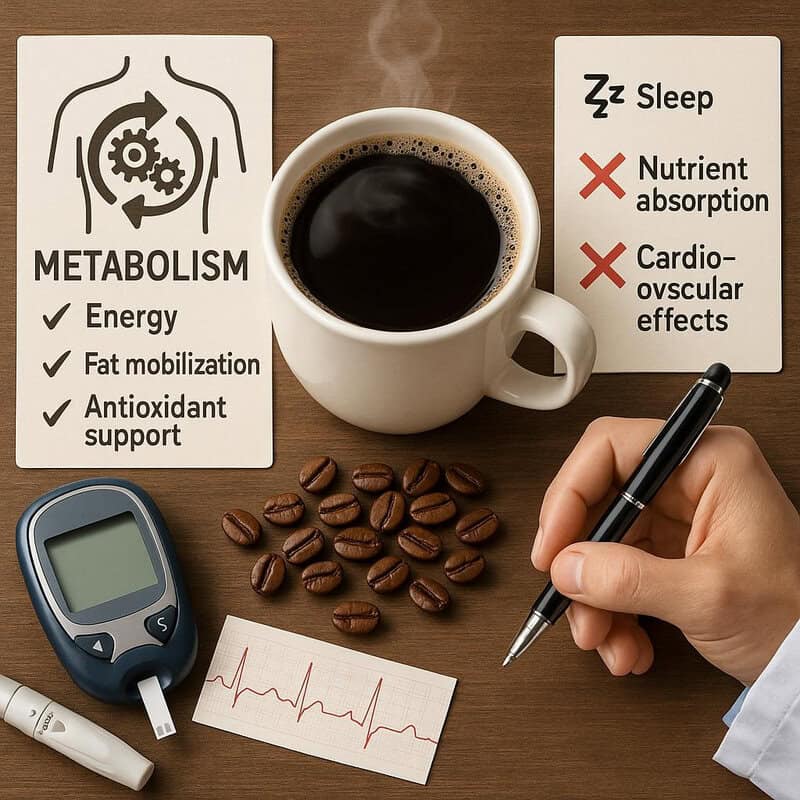
Coffee’s daily impact on metabolism is multifaceted—offering benefits like enhanced energy, fat mobilization, and antioxidant support, while posing risks such as disrupted sleep, altered nutrient absorption, and cardiovascular effects. Awareness and moderation are crucial for maximizing positive outcomes and minimizing drawbacks. Individuals vary widely in their responses, so it’s wise to monitor your body’s signals and adjust intake accordingly. Consulting a healthcare provider before making significant changes to your coffee routine is especially important for those with existing health concerns. For personalized insights, consider metabolic screenings or assessments. For more information, visit resources like the CDC’s metabolic health page or speak with a registered dietitian.
Disclaimer
The information provided in this article is for general informational purposes only. While we strive to keep the information up-to-date and correct, we make no representations or warranties of any kind, express or implied, about the completeness, accuracy, reliability, suitability, or availability with respect to the article or the information, products, services, or related graphics contained in the article for any purpose. Any reliance you place on such information is therefore strictly at your own risk.
In no event will we be liable for any loss or damage including without limitation, indirect or consequential loss or damage, or any loss or damage whatsoever arising from loss of data or profits arising out of, or in connection with, the use of this article.
Through this article you are able to link to other websites which are not under our control. We have no control over the nature, content, and availability of those sites. The inclusion of any links does not necessarily imply a recommendation or endorse the views expressed within them.
Every effort is made to keep the article up and running smoothly. However, we take no responsibility for, and will not be liable for, the article being temporarily unavailable due to technical issues beyond our control.





